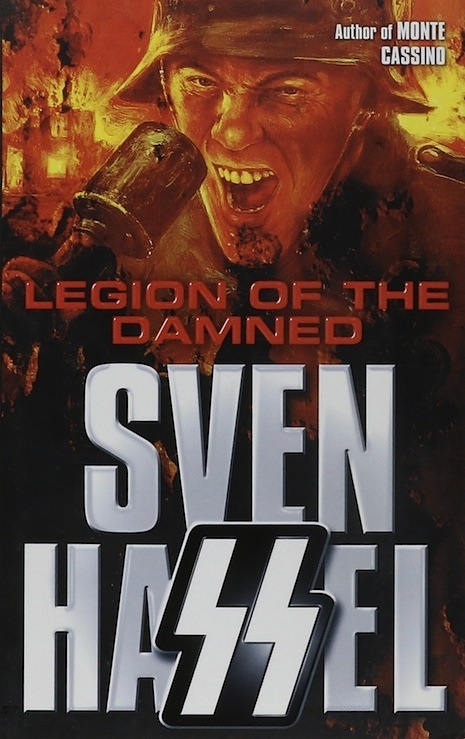
The Second World War claimed over 60 million lives and flattened most of Europe. Seventy-one years after it ended, the Second World War is still the got-to global conflict for hundreds, nay, thousands, of books, movies, TV series, comics, and gung-ho trigger happy violent computer games. The Second World War is the war that just keeps on giving.
One old soldier who made a small fortune from writing about his exploits fighting with the Nazis during the war was Sven Hassel. His fourteen semi-autobiographical books have sold 53 million copies worldwide, with a staggering 15 million sold in the UK alone.
Hassel’s books were “pulp fiction staples in the 1960s and ’70s to a male cohort that may have its equivalent today in those who sustain a billion-dollar industry in war-themed video games.” His tales of the band of renegade German soldiers, deserters and prisoners—a Nazi “Dirty Dozen”—who fought on the Russian front were supposedly based on the author’s own experiences. This band of brothers hated Hitler, hated war, killed their superior officers and indulged in “steamy sex with consenting local women.” It all sounds rather fantastical—and led one Danish newspaper to denounce Hassel as a fraud, claiming he never fought with the Germans but saw out the war at home and based his best-selling novels on secondhand stories and movies.
These claims can still be found on Hassel’s Wikipedia page—despite Hassel presenting documentary evidence in the form of his Heeresstammkarte (Hassel’s official military record—issued by the German army), photographs, medals and scars to prove he had indeed fought with the Wehrmacht. This led to a retraction from the newspaper that published the allegations.
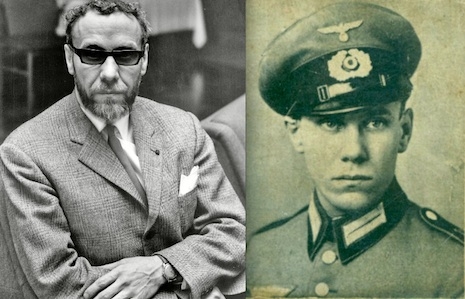
Author and soldier Sven Hassel.
Hassel was born Sven Pedersen in Fredensborg, Denmark, on April 19, 1917. He did military service with the merchant navy, before leaving Denmark to look for work in Germany. Hassel later claimed:
Germany was obviously not the right country to move to, but then again, you must remember that those times were chaotic and at that point there was still no war.
There may have been no war, but the persecution of the Jews was well under way and the Germans had been involved in horrific bombings of civilians during the Spanish Civil War—so, it does seem (shall we say) rather unbelievably strange why he chose to move to Nazi Germany rather than France or Belgium or even the United Kingdom.
Hassel signed up for the Wehrmacht in 1938—after falsely claiming his father was an Austrian—enrolling in the “2nd Panzerregiment and later in the 11th and 27th Panzerregiment (both in the 6th Panzer Division).”
We were trained to become the world’s best soldiers through the use of Prussian methods that surpassed any evil and terror you can imagine.
Maybe that was why Hassel attempted to desert. He was caught and sent to the penal battalion of the 27th. Here he met many of the characters who later appeared in his novels. He was wounded eight times, and “transferred to the Abwehr (espionage) in Denmark for a few months (from December 1944 to January 1945).” Denmark was occupied by Germany throughout the war—4,000 Danish volunteers died fighting alongside the Germans on the Eastern Front.
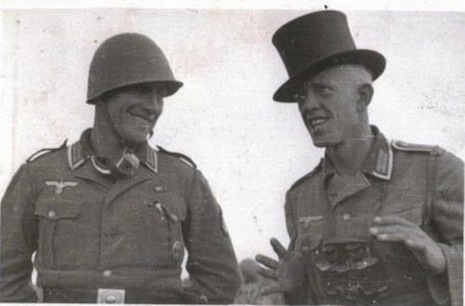
Photograph of two German soldiers purportedly “Tiny” and Portas who featured in Hassel’s books.
After the war, Hassel was a P.O.W. in various prison camps, before he was returned to Denmark where his citizenship was canceled and was again sent to jail. It was during his time in prison that Hassel started writing The Legion of the Damned. Since its publication in 1953, The Legion of the Damned has never been out of print—making it the only “Danish novel that has been sold consecutively for more than six decades since its first edition.”
Hassel’s novels are but one part of the bizarre enduring fascination the West has with the Second World War, in particular the Nazis, those scum-sucking evil psychopaths who perpetrated genocide on the Jewish people and slaughtered anyone else who disagreed with their policies or didn’t quite fit the desired profile.
This cultural obsession with these fuckers attracts some very strange bedfellows including hipster favorites like Lemmy—who liked collecting Nazi memorabilia; Bryan Ferry—who once admitted a passing regard to the stylishness of Nazi iconography; punk rockers who wore swastika armbands to allegedly shock the very people who had fought the Nazis back in the day; just as Brian Jones had once dressed up as a Nazi—with his then girlfriend Anita Pallenberg—to shock the flower power generation; and let’s be honest, even those damned hippies, gott in himmel, drove Volkswagon Beetles—which are nothing short of Hitler mobiles.
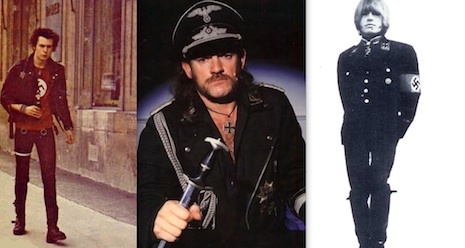
Sid in swastika T-short, Lemmy and his collection, Brian posing for the camera.
Not that any of these lovelies were or are Nazis—rather they are examples of a strange cultural phenomenon—an interest in Nazism—be it uniforms, iconography, medals or weaponry—that has lasted for over eight decades. It should also be pointed out that these musicians are all English—as the country has a very strange relationship with the Nazis and the Second World War.
In England or Britain as a whole, Der Fuhrer and his gang of merry Nazis are fodder for long-running sitcoms like Dad’s Army or ‘Allo ‘Allo! or failed sitcoms like Heil Honey I’m Home or skits by Monty Python and Spike Milligan.
And then there are the endless TV dramas of life during wartime like Colditz, Back to the Land, Secret Army, Danger UXB, Foyle’s War.
The Brits, you see, have this thing where they can go on and bloody on about past battles, victories, defeats and yon noble war heroes who sent people homeward to think again or died for King and Country. From Gordon of Khartoum, to Wilfred Owen, to Dunkirk, the Battle of Britain and the Normandy landings. It’s in our national anthems. It’s in our street signs and place names. It’s deep within our national psyche.
It’s no accident the Brits produce TV series like Downton Abbey as we love to wallow in an idealized nostalgia of a fantasy past where people are reassured that things were better in the olden days when life was structured (or class-ridden) and everyone knew their place.
This cultural obsession with the past might also explain why the Brits, or in particular the English, have an obsession with the Nazis as they represent the uber bogeyman whose defeat (in two world wars and one World Cup) enhance the national self image as one of great strength, bravery and utter moral superiority.
Of course, none of this mattered a jot to Sven Hassel who just counted the royalty checks. Anyway, Hassel considered his books as anti-war:
My books are strictly antimilitary. They correspond to my personal view of what I experienced. I write to warn the youth of today against war. I am writing the story of the small soldiers, the men who neither plan nor cause wars but have to fight them. War is the last arm of bad politicians.
Hassel died a wealthy man at the grand old age of 95 in 2012. Not a bad innings.
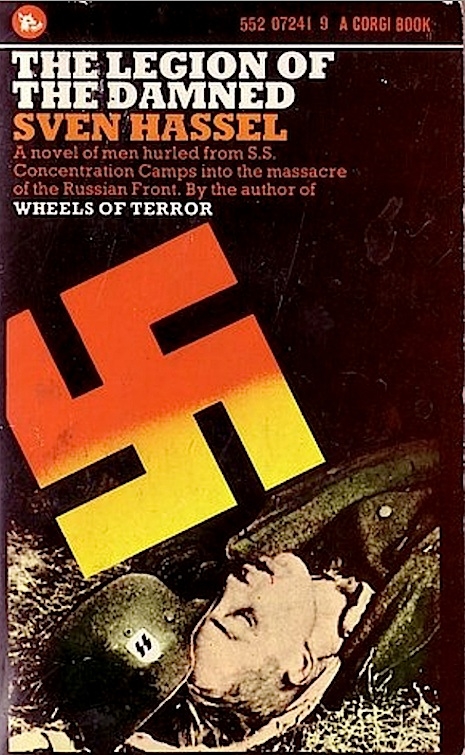
More after the jump…








